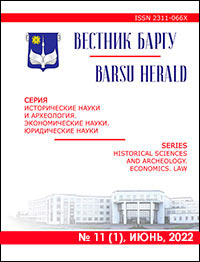METHODOLOGICAL CHANGESIN AMERICAN HISTORICAL SCIENCE IN THE 1970—1980S
Keywords:
American historical science; methodology; historical disciplines; crisis; postmodernism; fragmentationAbstract
Throughout the 20th century, especially in its second half, the history of the United States of America has been actively changing. In the 1960s, American universities were replenished with new students. A significant part of them were
occupied by people from backgrounds who previously had no access to higher education. The process of fragmentation of historical science began, which intensified with the creation of new historical disciplines. The financial crisis became a catalyst for the struggle between different directions. In the 1970—1980s in the United States, such historical disciplines
as womenʼs, cultural, religious, environmental, public, racial history, the history of science and technology, etc., were widely developed. At the same time, the “giants” of historical science — intellectual and economic history, the history of international relations — significantly weakened. By the end of the 1980s, there were a large number of historical trends and concepts in the United States that opposed each other.
Fig. 2. Ref.: 20 titles.
Downloads
Published
Issue
Section
License
Copyright (c) 2023 Вестник БарГУ Серия "Исторические науки и археология. Экономические науки. Юридические науки"
Это произведение доступно по лицензии Creative Commons «Attribution-NonCommercial» («Атрибуция — Некоммерческое использование») 4.0 Всемирная.
Авторы сохраняют за собой право заключать определенные договорные соглашения, касающиеся неисключительного распространения опубликованной версии работы (например, размещать ее в институциональном репозитории, публикация в книге) со ссылкой на ее первоначальную публикацию в этом журнале.





